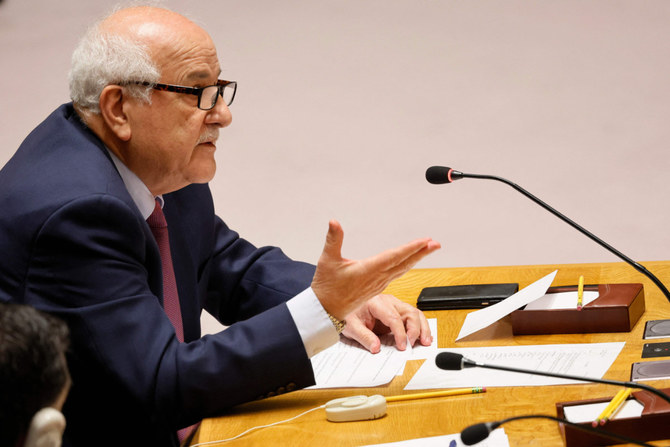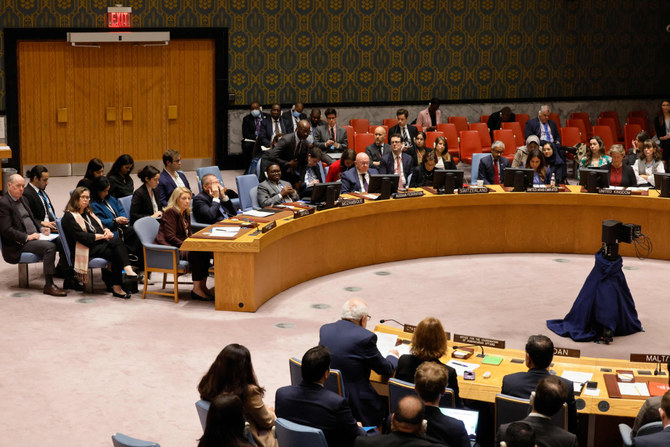



NEW YORK CITY: Palestine’s envoy to the UN on Friday slammed the organization’s humanitarian chiefs for failing to call clearly for a ceasefire in Gaza.
Speaking during a briefing on the situation in the besieged territory, Riyadh Mansour also criticized them for failing to mention “the elephant in the room,” which he said was the collective punishment being dealt to Palestinian children and women in Gaza, where the wounded are deprived of essential, life-saving medical supplies, and where the entire population continues to be denied electricity, fuel, medicine, food and water.
“What I heard from you today lacked the intensity and the humanity that you have demonstrated in previous reporting,” he told the UN humanitarian chiefs sitting across from him at the UN headquarters in New York. They including Martin Griffiths, the organization’s emergency relief coordinator, Lynn Hastings, the resident humanitarian coordinator for the occupied Palestinian territory, and Thomas White, director of the UN Relief and Works Agency in Gaza.
Earlier in the briefing, Griffiths spoke of the despair he sees when he talks to the relatives of Israeli hostages, and to Palestinian families in Gaza who have lost loved ones and their homes.
He said the situation that has been unfolding in Israel and Gaza since the start of the war is nothing short of “a blight on our collective conscience.” He called for the release of all hostages and stressed the need to protect civilian infrastructure, and reiterated the need for “humanitarian pauses” in the conflict but stopped short of calling for a ceasefire.
Mansour told the humanitarian officials that their latest comments about the conflict were “stale.”
He added: “You (previously) described the situation as catastrophic; many of you said that it is bordering on crimes against humanity and genocide. But your reporting today did not ask for the thing that you have been asking for forcefully: a ceasefire. Stop the killing. Stop murdering the Palestinians in this massive large number.
“A ceasefire should be the first order of the day. Now, it has changed from ceasefire to pauses, which means, ‘Israel, continue killing the Palestinians but give us a few hours every now and then in order to get food and other stuff, but continue the fighting.’
“You have the responsibility of defending humanity and human beings. You should be saying, clearly and loudly in line with international humanitarian law, that an immediate cessation of all of these hostilities should take place. When war takes place, the first thing that is needed is a ceasefire.”
Mansour paid tribute to the “brave” rank-and-file UN workers who are on the ground in Gaza “acting according to their mandate, and their full commitment to protect the Palestinian people and help tell the story.”
He then called on the top humanitarian officials to be consistent in telling the story of the conflict as it is, and “not to try to customize the narrative for whatever reasons.”
Mansour added that he was “sorry for being extremely frank with you, because the situation of the Palestinian people in Gaza is beyond comprehension and beyond description, and it requires from all of us to do everything that we can to stop it and to stop it yesterday, not even today.”
White, the UNRWA director, delivered his briefing to the meeting from Rafah. He discussed the worsening situation there as fuel continues to run out, and warned that “we could soon have a situation where the raw sewage gushes out on Gaza streets.”
He concluded his comments by noting that “the Palestinian people are asking for a ceasefire.”
In response, Mansour asked him: “Are you a humanitarian officer? You’re not asking for a ceasefire? Only the Palestinians, the victims who are being killed and their children under the rubble, are the only ones asking for ceasefire?”
Griffiths and Philippe Lazzarini, the commissioner-general of the UNRWA, last week asked members of the Security Council to call for a ceasefire, echoing a call by UN Secretary-General Antonio Guterres.
Israeli authorities responded to this by demanding that Guterres resign for doing so. They maintain that a ceasefire would allow Hamas to regroup and rearm, and equate any call for an end to hostilities as tacit support for the Palestinian militant group.
On the first day of the conflict, the US State Department sent out an email stating that media releases should not mention the word “ceasefire.”